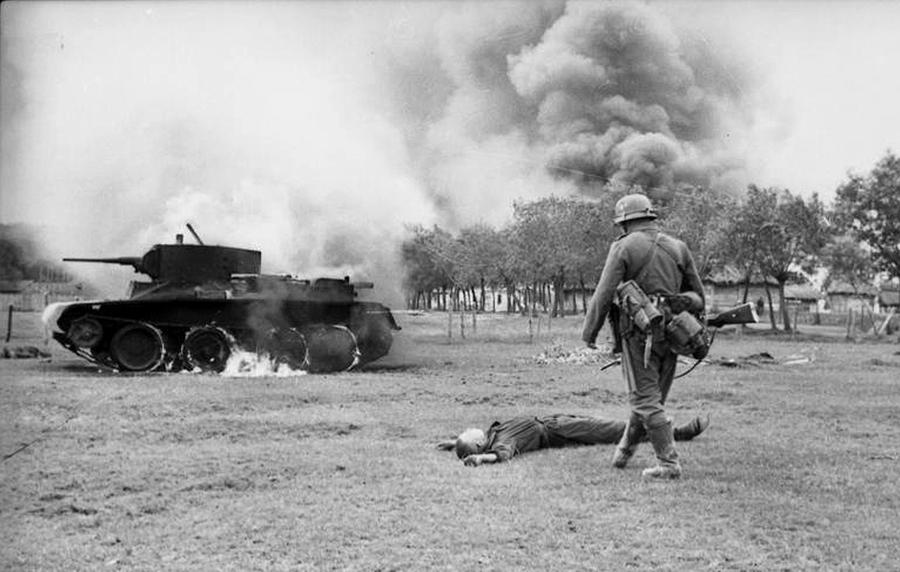
The Phoney Victory: The World War II Illusion, Peter Hitchens; I. B. Tauris, 288 pages, 2018
Peter Hitchens, the English author and writer for The Mail on Sunday, has written a little book that has caused a big stir in Britain. Written with verve, and incorporating anecdotes and vignettes that bring his arguments to life, The Phoney Victory: The World War II Illusion does not seek to remake the historiography of the Second World War, or the basic known outline of it to challenge what we know about the conflict in its fundamentals. There are no new startling revelations hidden for seventy-five years in dusty archives now excavated and held up to public view.
Indeed, Hitchens makes that very clear from the outset:
This book makes no claim to be primary research. It simply takes a number of events and developments that have been separately described by reputable historians and journalists, and connects them in a way that has not been attempted before."
Aware that his account would be—as it has been—attacked as “revisionist” or even in some way “philo-Nazi,” he takes pains to declare unequivocally what he is not writing and what he disavows. Near the beginning of his 229-page book Hitchens states that The Phoney Victory does not suggest that Britain should have made peace with Hitler after the fall of France in 1940. Far from it, the country was correct to continue the conflict after the hasty evacuation of British forces from the beaches of Dunkirk. He is not suggesting that England should have remained aloof and out of the war. To the contrary, he points out that the island nation was not ready for warfare in September 1939, and thus let events dictate strategy rather than the reverse. Nor does he take the view that war against Hitler was unnecessary. “At some point,” he writes, “for the good of Germany, Europe and the world, Hitler’s career had to be ended, probably by force, from within or without.”
"[H]itchens’ little book shows in broad strokes how the Second World War was managed—and at times—bungled; then, ironically, despite the military victory of the Allies, how its winners turned it into a phony victory, for which Britain—and the rest of the West—are still paying the price."
What he does is argue “that the war could have been fought differently and that [for instance] the British guarantee to Poland, by consciously giving Warsaw control over our decision to declare war, was one of the gravest diplomatic mistakes ever made by a major country.”
Hitchens, as he details both vividly and lovingly, grew up in an England which had seen its empire and its glory days disappear. That unraveling began on the slaughter grounds of World War I, which inflicted on the island nation shattering and catastrophic losses: the country’s governing class and the cream of its youth extinguished on the killing fields of Ypres and the fatal escarpments of Gallipoli, its treasury depleted, its social structures undermined. After another world war, no one, including Winston Churchill, could halt the decline. Britain was shorn of its material grandeur and soon, too, its colonial empire, although it clung fiercely to the memory of its long history of accomplishment, of the valor and glory it won both at sea and on land.
In Hitchens’ youth the words of Churchill echoed in every schoolboy’s ear, as they still do eight decades after the British retreat from France in late May 1940. His immortal words, “This was their finest hour,” had resounded in Parliament on June 18, just two days after the defeated French sued for peace. World War II had been “the good war,” as we continue to call it, in which freedom, truth, and morality had triumphed over evil, darkness, and barbarism.
Hitchens cites Prince Charles, heir to the British throne, in the BBC broadcast “Thought for the Day” (December 22, 2016), in summarizing the generally held view of why the Allies went to war in 1939 and in 1941: to defeat “intolerance, monstrous extremism and an inhuman attempt to exterminate the Jewish population of Europe.” And yet this view is contradicted by the facts and by the history of period, which Hitchens sets out to document. How the war and its aims were initially framed and presented reflects a rather different situation than what people typically learn from their schoolbooks. As Hitchens details, the drive to moralize the war, turning it into a uniformly and unambiguously “good war,” leaves out too much that should cause succeeding generations to examine more carefully both the motives and decisions of those responsible for conducting the war and ensuring the subsequent peace, especially Sir Winston Churchill and the pivotal role he played.
Hitchens examines several major questions surrounding both Britain’s entry into the Second World War and how it was conducted. In particular, he takes a hard and thorough look at the Polish guarantee of March 31, 1939. As he indicates, this guarantee by Britain and France to provide military aid to Poland was a result of the occupation of the rump Czech Republic by Germany two weeks earlier, and of the effective voiding of the Munich Agreement of September 1938. But the terms of the Polish guarantee were almost certain to lead to war with Germany, and British leaders knew it. Hitchens cites historian Simon Newman (March 1939: The British Guarantee to Poland; 1976) to the effect that the fate of England, and then Europe, depended on a military junta in Warsaw whose decision to begin or respond to conflict would ineluctably trigger Britain’s involvement. What is more, a secret protocol basically exempted any British response should an attack come from the USSR. Therefore, when Stalin’s legions invaded the eastern half of Poland in mid-September, Britain’s reaction was essentially to do nothing.
Quoting Newman, and citing both Lord Halifax and Churchill, Hitchens asserts that this was clearly designed to keep open the possibility of a future alliance with Stalin, something British and French diplomats had contemplated as early as summer 1939. Indeed, Sir Winston had, on October 1, 1939, declared:
We could have wished that the Russian armies should be standing on their present lines as friends and allies in Poland instead of as invaders. But that the Russian armies should stand on this line was clearly necessary for the safety of Russia against the Nazi menace [the italics are Hitchens’].
Eventually, Britain (and the United States) did ally with Stalin against Hitler. But, Hitchens asks, how does an alliance with a power arguably just as bad as Nazi Germany support the lily-white “good war” narrative? And, more pointedly, when the Americans and English leaders understood what Stalin and the People’s Commissariat for Internal Affairs legions had done and were doing, not just in 1945, but much earlier?
Certainly the arguments in favor of a Soviet alliance in 1941 are strong, in a purely strategic way. Britain, and then the US, were engaged in a total war against the German dictator who had, also, taken direct aim at Russia, reaching the suburbs of Moscow in December 1941. Thus, the refrain “the enemy of my enemy is my friend” took shape and made sense. And there followed the massive material support, mostly from America, to bolster the Russian war effort which proved vital in defeating the Wehrmacht. More troubling was the choice by the allied leaders, late in the war at Yalta and then at Potsdam, to turn a very noticeable blind eye to exactly what Stalin and his Communist minions were doing in Eastern Europe. By the time of Sir Winston’s famous “Iron Curtain” speech on March 5, 1946 at Westminster College in Fulton, Missouri, recognition of this came too late.
Along with the concessions made to Stalin at Yalta, it is the Potsdam Agreement (August 1945) that Hitchens reserves for especially critical scrutiny. One of its central protocols—on which Stalin had insisted and to which the Western Allies acceded—directed the forcible population transfers to Germany of some thirteen or fourteen million German civilians living in Poland, in Czechoslovakia, and in other Eastern European countries, countries in which they had lived peaceably for centuries. These population expulsions were to be made, according to the wording at Potsdam, in an “orderly and humane” fashion. Yet, most of those transfers were accomplished under brutal conditions during the frigid 1945-1946 winter, with civilians taking almost nothing with them, save for the clothes on their backs. During the painful transit, often by foot or wagon cart, thousands were massacred by Communist guards and partisans; hundreds of thousands of others died of cold or starvation, as many as 1.5 million by some estimates.
Hitchens cites the comprehensive study by Ray M. Douglas (Orderly and Humane: The Expulsion of the Germans after the Second World War; 2012) for its unsettling historical details. But Douglas’ account was not by any means the first. A few years after the war, the English jurist F. J. P. Veale wrote Advance to Barbarism (1953), denouncing the implicit criminality of having such a “cruel peace” serve as the consummation of a “good war.” More recently, authors and historians as diverse as Nikolai Tolstoy (The Secret Betrayal, 1944-1947; 1977), Alfred de Zayas (Nemesis at Potsdam, 1941-1945: The Anglo-Americans and the Expulsion of the Germans; 1979), Canadian James Bacque (Other Losses; 1989), and Joachim Hoffmann (Stalin’s War of Extermination, 1941-1945; 1999) have documented the horrors suffered by millions of civilians during that period.
The response to such accounts has been, of course, to point to the barbarities and crimes committed by the Nazis, by the Schutzstaffel and Einsatzgruppen, especially during Operation Barbarossa. In a sense, that argument goes, the “Germans deserved what they got” for supporting, evenly if only tacitly, Hitler’s aggression and criminality. It is maintained, moreover, that the expulsions were necessary to achieve national harmony in postwar Europe and to placate our ally Stalin.
As Hitchens rightly points out, however, two wrongs do not produce a right. War dictates brutal actions that have inhuman consequences. The mass uprooting at the point of a bayonet of thirteen million civilians, almost entirely made up of women, children, and older men, meant exposing them to violence and cruelty, and the Western Allies knew that. Under the Nuremburg Laws, it would have been a war crime itself.
Indeed, as Hitchens discusses in his critical appraisal of the Air Marshal Sir Arthur Harris and the English strategy of indiscriminate night bombing aimed at civilians, it is one thing to argue that the Allies sometimes engaged in tactics and actions that crossed the line, but a close consideration reveals that both the English and Soviets practiced direct assaults on civilians as part of their overall strategy. Hitchens carefully examines the firebombing of Hamburg, “Operation Gomorrah,” which practically devastated the entire population center of that city. He follows with a list of major German cities which suffered similar levels of death and destruction and misery, including Dresden in February 1945, an act of barbarism committed long after the result of the war was settled. It was a strategy that failed to shorten the war by undermining the German will to fight, while inflicting appalling suffering on the most helpless and defenseless segment of the German civilian population.
It is now pretty much beyond debate that Harris’ air campaign did not slow down German arms production (which was dispersed into rural areas), and did not put much of a dent in German morale. Only the actual capture of German territory in late 1944 and 1945 did that.
In defense of such tactics, the German bombing of Coventry and the Blitz are cited, as if those attacks somehow justified the later massive incineration of dozens of German cities. To the response that such action was needed to fend off a potential German invasion, Hitchens points out that most of the attacks came after such an invasion was a moot point; that is, after the German failure at Stalingrad made German defeat more or less inevitable:
Even if you believe that Hitler seriously intended to invade this country in 1940 or later, which the evidence shows he did not, the choice was out of Hitler’s hands before the main bombing campaign began in 1942….The final outcome of the German-Soviet war was not altered by the British bombing of Germany, which was relatively minor before the 1942 raid on Cologne and did not become intense until well into 1943. By the time significant and sustained bombing had begun, Hitler had been irreversibly defeated at Stalingrad, and the USA was in the war.
A major question that Hitchens addresses is British military preparation during the 1930s. In assessing what the country might have done differently, he is critical of Churchill’s consistent failure as an armchair strategist, a record that began during the First World War (the Battle of Gallipoli) and continued with Churchill’s fascination with “the soft underbelly of Europe,” with Crete and Greece, then Italy, and with his neglect of British defense in Malaya and Southeast Asia. Hitchens is aware of Andrew Robert’s newly-published defense of the English lion, Churchill: Walking with Destiny (2018), and he does not discount the vital role the British leader played (as he makes clear in his retort in The Mail on Sunday to Daniel Johnson’s review). Rather, it is the nearly impenetrable mythology that has developed around Churchill that troubles Hitchens, this group-think having cemented the unquestioning, rosy view of “the good war.” There have been earlier attempts to dissect and critique the Churchill legacy, including by historians Maurice Cowling (The Impact of Hitler: British Politics and British Policy, 1933-1940; 1975) and John Charmley (Churchill: The End of Glory; 1993), but the established view of Churchill as a heroic statesman continues, and in England even minor criticism is often deemed “unpatriotic” or “revisionist.”
Hitchens interestingly defends Neville Chamberlain against the charge that he was an appeaser. Like Charmley in his defense of the unfortunate English leader, Chamberlain and the Lost Peace (1989), Hitchens notes that between 1934-1935 and 1939-1940 Chamberlain more than tripled British military spending, including a whopping jump in budget from 17,617,000 pounds to 248,561,000 pounds for the Royal Air Force: “The truth is…Britain under [Stanley] Baldwin and Chamberlain most certainly did rearm, though for imperial and national defence, not for a continental land war….”
Which, then, raises the question: At any time prior to the American entry into the war in December 1941, could England, even in alliance with France, have actually stopped Hitler?
Although not addressed by Hitchens, historians Richard Lamb (in his Mussolini as Diplomat: Il Duce’s Italy on the World Stage; 1999) and Roy Denman (in Missed Chances: Britain and Europe in the Twentieth Century; 1997) believe England missed perhaps its best opportunity to halt German expansion westward with the Stresa Front formed in April 1935. That accord had brought together the United Kingdom, France, and Italy in an alliance directed specifically at preventing German expansion of the very kind that would occur in 1938 through its annexation of Austria. In 1934, when Austrian Nazis attempted a coup in that country, Mussolini rushed Italian troops to the Austrian border at the Brenner Pass and threatened Germany if it should attempt to seize the country.
Yet, the British torpedoed Stresa. Mussolini was infuriated by the Anglo-German Naval Agreement (June 1935), completed secretly with the Germans without the knowledge of (or input from) France or Italy, and by the bungled attempt by the British and French to end the war between Italy and Abyssinia in the Italian leader’s favor, via the abortive Hoare-Laval Pact of December 1935. The agreement would have granted Italy some territory in Abyssinia, but preserved that mountainous empire’s independence with access to the sea given by Britain. The pact was shipwrecked by a wave of popular moral indignation in Britain and France by citizens who were enraged at what they saw as a violation of the elementary principles of the League of Nations. Despite Mussolini’s disdain for the German Führer and his revulsion at Nazism (his ally, Austrian Chancellor Engelbert Dollfuss, had been assassinated by Austrian Nazis in 1934), such backroom dealings, which could be reversed by manifestations of popular outrage, convinced Il Duce that he could not trust Britain. And so it thrust him into the arms of Germany.
In Lamb’s words, “Mussolini was on the brink of accepting the Hoare-Laval proposals; indeed he had already told Laval that they satisfied his aspirations. His acceptance would have meant the end of the Abyssinian war, and Italy would have happily rejoined the Stresa Front, leaving Hitler isolated.”
In the event, Italy left the Stresa Front. And after May 1940, Britain was increasingly dependent, financially and materially, on the Americans for survival, a condition that, as Hitchens recounts, led to a continuing transfer of British gold reserves and wealth to the United States.
The final outcome of the war saw America emerge as the world’s leading power (though it was challenged by the USSR), while Britain’s precipitous decline continued, and within a decade or so, it was forced to give up its great colonial empire.
Peter Hitchens intersperses his account of the Second World War with illustrative references from contemporary novels about the war, along with reminiscences by individuals who lived through the period. In so doing, he provides an exceptionally rich version of the events. Though it is no academic tome, and though it breaks no new ground, Hitchens’ little book shows in broad strokes how the Second World War was managed—and at times—bungled; then, ironically, despite the military victory of the Allies, how its winners turned it into a phony victory, for which Britain—and the rest of the West—are still paying the price.

